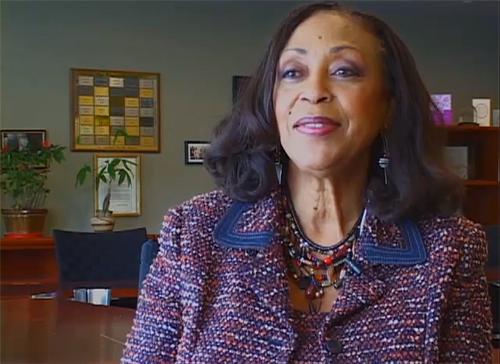
Professor Hill-Moore interviews with Veteran Feminists of America. (Courtesy of VFN)
Being the first to do anything takes a great deal of courage. Barbara Hill-Moore, Meadows Foundation distinguished professor of voice, was the very first tenured African American professor at SMU and she blazed a trail for the acceptance of minority students on campus.
Hill-Moore, a world-renowned Soprano, has performed with operas and orchestras worldwide and has worked with artists such as Leonard Bernstein and Justus Franz.
However, before she began teaching master classes in foreign countries and singing on tours throughout Germany, Hill-Moore was raised from humble beginnings.
“I didn’t know it at the time but I was poor. I was very poor,” Hill-Moore said.
“But I was fortunate because I had both my mom and dad and we lived in an area where that was not so common.”
Hill-Moore grew up in the Pruitt-Igoe housing projects in St. Louis, Miss.
The living conditions were less than suitable for her family, Hill-Moore recalled, and the automatic prediction for the children that grew up in Hill-Moore’s neighborhood was failure.
However, Hill-Moore had devoted parents who stressed the idea of education.
From a young age she was always understood that one day she would go off to college.
Although the integration of blacks and whites had only started a year prior to Hill-Moore’s attendance, the teachers at her high school were inspirational to her.
“We had the best teachers,” Hill-Moore said. “They were devoted and inspiring.”
Her teachers’ positive impact only reinforced her commitment to a dream that she had developed at the age of seven: her dream of being a teacher.
Alongside teaching, Hill-Moore also cultivated another passion at a young age. She loved to sing.
“Singing was always in my life, I sang when I was a child, I sang in church, I sang in school and I loved it,” Hill-Moore reminisced.
After earning both her Bachelors and Masters of Science at Lincoln University and the University of Illinois, respectively. Hill-Moore’s first teaching job at the collegiate level was at Millikin University.
While in graduate school, Hill-Moore met a professor by the name of Bruce Foote who convinced her teach vocal performance.
He would eventually invite her to interview as a professor for SMU. After accepting the job, Hill-Moore would go on to face some trials that she had already foreseen.
“I had thoughts that this was the serious South and I didn’t think I would enjoy living here,” Hill-Moore said.
“When I got here I think there were seven [African American professors], but they were not tenured. I was tenured three years after I got here and I was the first.”
Hill-Moore was not only the lone tenured African-American professor, but she acted as the only black professor in Meadows.
“For about 11 years I remained the only one,” Hill-Moore recounted.
“I’ve been here 38 years, I am sure I’m the longest tenured person of color on this campus.
Being one of the few African-American women on campus, Hill-Moore faced several accounts of racism even within the SMU community.
However, she never shied away from confrontation or insult, instead she would confront prejudice head on.
“I experienced faculty moving from one side of the room to another in faculty meetings,” Hill-Moore, as she remembered specific accounts, said.
“But I was not the easiest person to deal with because I just got up and moved right along with them. Whenever they moved I would too. I didn’t make it easy for them or myself.”
Students especially learned from Hill-Moore about the significance of standing up for themselves against prejudices.
“I teach my students that there is no second class to artistry.” Hill-Moore said. “You do it because you love it.”
SMU student Dameron Growe is a Meadows major and has known Hill-Moore for some time. He believes that Hill-Moore is more dedicated to her students than any other professor that he has encountered.
“She is 100 percent dedicated and she will most definitely push you to be the best,” Growe said. “You had better come prepared and ready to work.”
Even more so than the fact that she was the first tenured professor of color, Hill-Moore is proud that she paved the way for more minority students to enroll at SMU and for other minority professors to be hired at SMU even though the pattern of hiring African-American teachers didn’t formulate until the 1980’s.
“I’m proud that somebody had to do it and I think it was my destiny to be that person,” Hill-Moore said.
In the summer, Hill-Moore travels to South Africa where she teaches classes for free. Eventually, she founded an SMU study abroad program in Capetown.
Former SMU Student Roza Essaw took the trip to South Africa with Hill-Moore.
“South Africa was one of the most amazing and unforgettable experiences of my life,” Essaw said.
Hill-Moore believes that visiting foreign countries gives students new perspectives and helps them to understand culture outside of their own.
Diversity and the integration of cultures is what Hill-Moore wants to see most when she looks at her students.
She strived to pave the way for minorities to be on campus and she is proud that she is seeing the fruits of her labor.
“My studio looks like a rainbow tribe,” Hill-Moore said.
“I have students from Korea, I have students from South Africa, my students are from everywhere and I’m proud of that. ”








